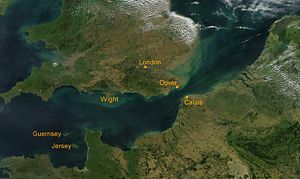
Back Opération Donnerkeil French Operasi Donnerkeil ID Operazione Donnerkeil Italian Operatie Donnerkeil Dutch Operação Donnerkeil Portuguese Operațiunea Donnerkeil Romanian ปฏิบัติการด็อนเนอร์ไคล์ Thai 霹雳行动 (德国) Chinese
This article may require copy editing for grammar, style, cohesion, tone, or spelling. (November 2023) |
| Operation Donnerkeil | |||||||
|---|---|---|---|---|---|---|---|
| Part of the Western Front of World War II | |||||||
 Satellite view of the English Channel | |||||||
| |||||||
| Belligerents | |||||||
|
|
| ||||||
| Commanders and leaders | |||||||
|
|
| ||||||
| Strength | |||||||
| ~450 aircraft |
252 Bf 109 and Fw 190 fighters[1][2] 30 Bf 110 Heavy fighters[2] 32 Dornier Do 217s | ||||||
| Casualties and losses | |||||||
| 41 aircraft[3] |
17 fighters 5 bombers 23 airmen killed[3] | ||||||
Unternehmen Donnerkeil (Operation Thunderbolt)[4][5] was the codename for a German military operation of the Second World War. Donnerkeil was an air superiority operation in support of Operation Cerberus, also known as the Channel Dash by the Kriegsmarine (German Navy).
In 1941 Kriegsmarine surface vessels had carried out commerce raiding in support of the German U-boats in the Battle of the Atlantic. In January 1941 Operation Berlin was launched followed by Operation Rheinübung in May 1941. The dominance of the Royal Navy's surface fleet prevented the German units returning to ports in the Baltic Sea or Germany. The surviving ships, the battleships Scharnhorst and Gneisenau and the cruiser Prinz Eugen, docked in the port of Brest, France. Throughout 1941 RAF Bomber Command attacked the ships in dock. The proximity of the ports to Royal Air Force (RAF) airfields allowed a large number of sorties to be flown against the targets in quick succession. Oberkommando der Marine (the Naval High Command), and Adolf Hitler desired to move the ships out of range of potential air raids.
In December 1941, Oberkommando der Luftwaffe (High Command of the Air Force) was ordered to plan an operation to protect the three German capital ships to escape from Brest to Germany through the English Channel. General der Jagdflieger (General of the Fighter Force) Adolf Galland prepared the aircraft for the operation. Cerberus and its supporting operation, Donnerkeil, began on 11 February 1942. During the first phase of the operation the Germans achieved surprise. The German ships reached Germany on 13 February 1942, two days after the start of Cerberus and Donnerkeil.
During the Channel Dash the Luftwaffe defeated British air attacks on the German ships, allowing them to reach German waters. In the air battles that took place over the Channel the British suffered many losses for no return; German losses were modest and the operation achieved its objective.
- ^ Caldwell 1996, p. 204.
- ^ a b Weal 1996, p. 15.
- ^ a b Hooton 1994, p. 116.
- ^ Hooton 1994, p. 114.
- ^ Baker 1996, p. 190.